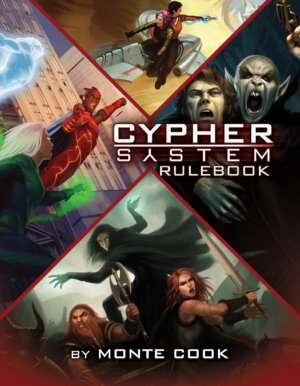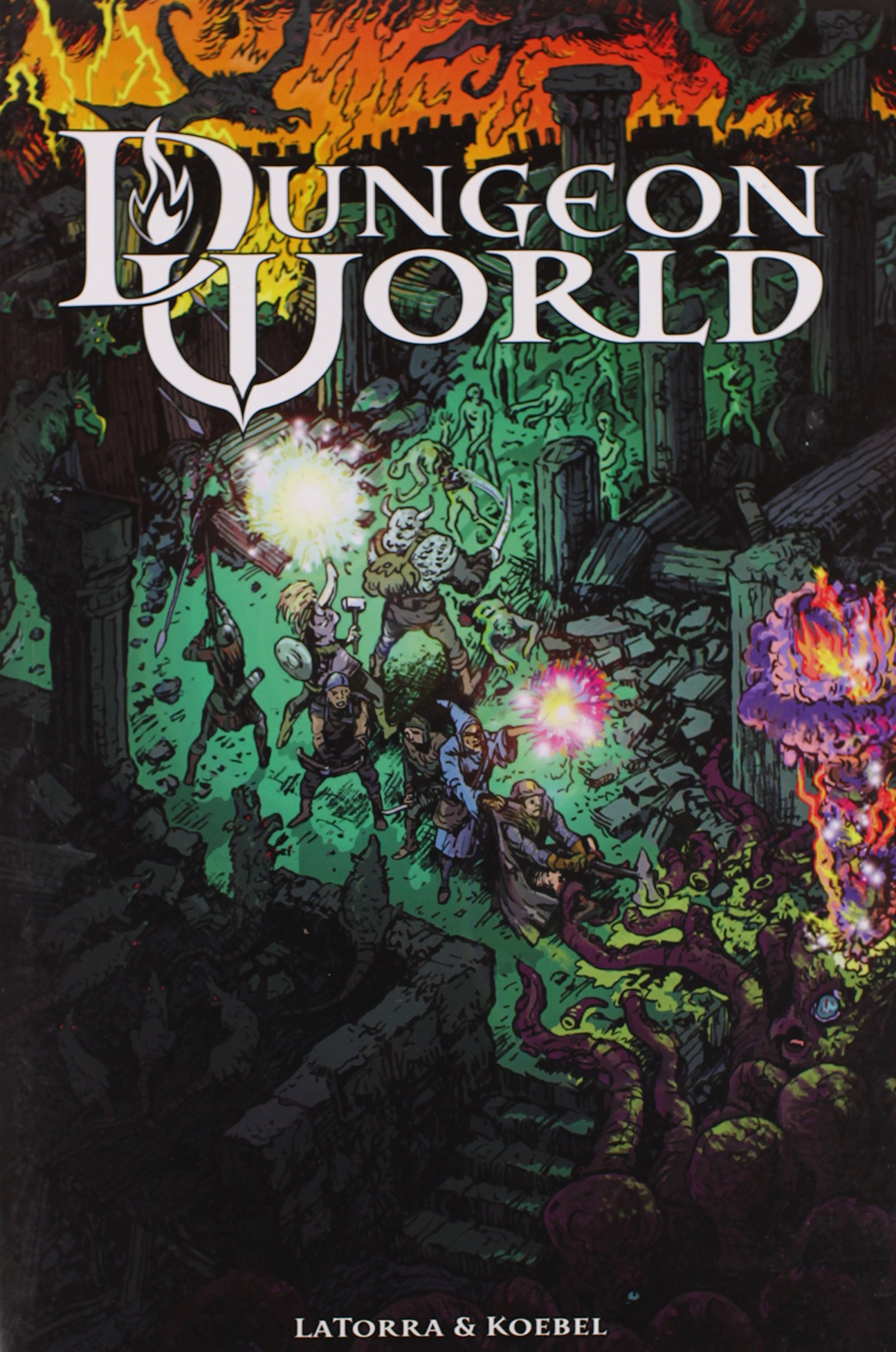I have very clear goals for what I need to focus on completing this month...
So, of course, I've gotten distracted by a smaller more personal project.
 I recently tried to run a Numenera game for new players, mostly unfamiliar with tabletop RPGs or the setting of the Ninth World. I was using one of the adventures from Weird Discoveries. These adventures are designed to be run with little to no prep and sort of be the sort of thing one could recommend in the place of a board game. My experience running some of these with my regular players is that they have taken roughly 1.5-2 hours. We spent 3+ hours playing and didn't finish the adventure.
I recently tried to run a Numenera game for new players, mostly unfamiliar with tabletop RPGs or the setting of the Ninth World. I was using one of the adventures from Weird Discoveries. These adventures are designed to be run with little to no prep and sort of be the sort of thing one could recommend in the place of a board game. My experience running some of these with my regular players is that they have taken roughly 1.5-2 hours. We spent 3+ hours playing and didn't finish the adventure.
Which is fine. And I think that the players mostly had a good time, which is good. That's the objective.
But I was a bit surprised by how...slowly things seemed to go. Which isn't my normal experience with Numenera/Cypher System. Especially since I had chosen something I thought would be fast/exciting for my new players. I don't think either my players or I did anything wrong, and, as I said, it wasn't a bad experience. It just wasn't the experience I'd expected to have.
I spent a lot of time questioning if there was something that I could have run which would have been more in line with my objectives.
My objective was this: to find something that could introduce new players to roleplaying games with a simple system and fast-paced/exciting adventure.
Thus began my Descent.
 Other Cypher Solutions
Other Cypher Solutions
The adventure that I had chosen started with discovery/exploration/exposition. I think that this gained the players attention, but also brought the focus more on details and investigation, rather than action and excitement.
Therefore, choosing an adventure that starts with action/adventure/excitement would better engage players from the start.
The players spent a lot of time questioning things and looking deep into he details of the world. For a campaign, this can be great. For a one-shot adventure, this can slow things down. I partially wonder if some of the level of questioning is because of the odd-ness Numenera's setting, the Ninth World.
Therefore, I determined that choosing a setting similar to those that the players are more familiar with would require less questioning and side knowledge.
But, I also wasn't terribly convinced that Cypher System would have been my best bet. So, I moved on to looking at the other system I had with me...
The Puddle
The puddle is a fun little system, and I happened to have one-page rules supplement handouts with me.
The puddle is a highly narrative game where characters start with six defining characteristics each determined by the individual players.
With good enough successful roles, the Puddle actually puts narrative control in the player's hands temporarily.
In my experience, it tends to move very fast, and I imagine it would be actually pretty difficult to get caught up in the weeds with it.
That said, it requires a lot of creative thought on the part of the players. From coming up with aspects to taking narrative control, it requires an element of storytelling on the part of those playing it. For people who aren't familiar with roleplaying games, this can be somewhat intimidating.
Additionally, because the mechanics are so highly narrative and so different from standard RPGs, I think it can be a poor introduction to the general world of RPGs.
Having looked at the Puddle, my brain moved on to another system which I wouldn't have been prepared to run at the time, but that I at least had experience with and owned the book for.
 Savage Worlds
Savage Worlds
Savage Worlds boasts being "Fast, Furious, and Fun." And, from my limited experience with it, it does that pretty well.
If I'm looking for a "realistic" or "high quality" game that I'd run for a long time, I probably wouldn't choose Savage Worlds. The dice probabilities are a bit wacky, which can be fast, furious, and fun, but doesn't contribute the reliability/predictability that I'd like from a more solid game.
But it is fun. It does tend to run at a fast pace. It's not as easy as Cypher System is on the GM, but it's still far easier on them than traditional D&D or Pathfinder would be. The rules are pretty straightforward and easy to understand.
For a while, my mind was like "okay, yeah, this is a good system for my objective." And it's true, Savage Worlds would have perfectly met the original objective.
But...one of the things that I like about Cypher, and possibly one of the things that has kept it as my primary system for all this time, is that I like being able to sell my materials. If I put a lot of work into making up a One Shot Adventure, I like that I can be rewarded for that work. Savage Worlds lets fans put out whatever they want for free, but is a bit more restrictive when it comes to licensing. Now, they're more open than some RPGs to letting people use their system, but I think that obtaining licensing permission from them is still a bit beyond my reach.
So, this led me to considering beyond that...
 FATE Accelerated
FATE Accelerated
Once upon a time, I ran a Dresden Files game using FATE that didn't turn out quite how I had planned. I think that to legitimately run FATE well requires a partial shift in how I GM games. And it requires me figuring out a better way to track all the Aspects in play.
That said, FATE is a game that falls somewhere between Narrative games and mechanical games. Every character (and many elements of the world itself) have qualitative Aspects that can be invoked in order to have a narrative and/or mechanical effect on the story. Every character also has skills which are rolled against difficulty ratings.
FATE Accelerated is a simplified version of the system with less skills to keep track of where how one does something is more important than what one is actually doing. This seemed like it could make it better for one-shot games with new players. Additionally, FATE has an open license, so I could publish anything I put together for it.
But, in truth, if I were to run FATE again, I think that I'd prefer it to be with more experienced players and/or when my goal isn't necessarily having a fast-paced/exciting game.
That said, somewhat more as a side note, I have a Shakespeare One Shot idea for FATE Accelerated that I would love to try out sometime with a particular group of Shakespeare fans that I know. If I can ever put the adventure together.
 Dungeon World
Dungeon World
I have never played Dungeon World before. I've never seen it played. What I knew about it before looking into it was that it was fairly simplified generic fantasy, class-based, and that it had an Open Game License.
What I found was somewhat interesting to me. The game tries to turn plot twists and storytelling devices into "moves" for the GM, mechanically called upon at points in the game. This keeps the game moving as well as entrenched in narrative while still keeping a fairly mechanical system for the players.
Adventures, rather than being planned through events or locations, are planned through setting up fronts-usually threats to the world that the players will need to overcome-and the risks they pose.
I feel like a lot of what Dungeon World tries to set up for Game Masters in how it suggests they plan adventures as well as how they evolve the game over time is pretty good advice for Game Masters generally when it comes to running games. But, the thing is, it actually can be applied to any game. And apart from that, there's not much that makes Dungeon World stand out to me. It seems like a fine system, just not one that really grabs my interest in any way.
Further Descent
I spent a lot of time looking up different systems that had open game licenses, to varying degrees of obscurity. None of these were remarkable enough to be worth mentioning or even, apparently, remembering.
I also spent some time thinking of making my own system. I have lots of system-related thoughts that I'd like to explore in at least two different directions (one for a system of great depth and "quality" and another for a simple system that could be more legitimately run as a board game.) I also spend some time thinking of picking up programming again to try to put together something more like the later. (This may or may not be something I set to work on when I have more time.)
Around this time, in a Facebook group I'm a part of, someone was asking for suggestions for something that they could learn quickly and use for a one-shot that evening. It was here a suggestion was made that reminded me of a game I hadn't thought of in a long time...
 Risus
Risus
Like the Puddle, Risus is a nice, simple system for which the rules fit on a few pages. Like the Puddle, Risus has the players define their character's stats with quantitative descriptors. However, unlike the Puddle, Risus doesn't expect players to take narrative control of the story (removing that barrier for players who would be intimidated by it as well as making the game more traditional/mechanically based after characters are created.)
I happily think that Risus is the solution to the problem that I started out on. It's a silly game that's fast paced and decently good at what it does. The rules are simple and easy to understand. It's incredibly easy to make up and run stuff on the fly.
Like Savage Worlds, I would need to get permission if I wanted to sell any materials I created for Risus. However, unlike Savage Worlds, I can't imagine actually putting forth the level of detail and development for an adventure that I'd feel inclined to need/want to sell it. In the odd case that something like that were to happen, from what I can tell, it'd be easier to get permission to do so from the creator of Risus than it would be from the company that produces Savage Worlds.
As always, I reveal how big of a noob I am for admitting that I tend to be naive about just how many systems are out there. But I love how you know about so many and are able to use your assessment of them to know which one is best for each project.
ReplyDeleteI admit, I laughed thinking about how so many of the adventures I've been a part of took far longer than you or Nathan expected as GMs. It seems sometimes players end up being far more intrigued in the details of the world and end up spending way more time than anticipated by the GM. I realize my experience doesn't to compare to many others', but it did seem to happen a ton! I agree that it is typically not anyone's fault and that it is just an unpredictable factor to a large degree. At any rate, Sounds like you have some fun ideas on the horizon as always!